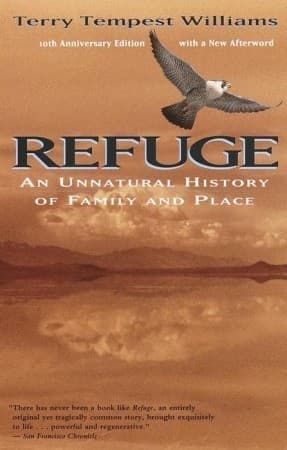
Book Review Summary: Refuge: An Unnatural History of Family and Place
Introduction
Refuge: An Unnatural History of Family and Place by Terry Tempest Williams is a powerful and thought-provoking book that explores the interconnectedness of family, place, and the natural world. Through a series of essays, Williams weaves together personal narratives and observations to create a tapestry of loss, resilience, and spirituality. In this article, we will delve into the book's themes, analyze readers' opinions, and provide reasons for both recommending and not recommending this powerful work.
About Terry Tempest Williams
Terry Tempest Williams is an American author, conservationist, and activist known for her evocative writing style and deep connection to the American West. Born in Utah, Williams has been influenced by the arid landscape of her native state and has dedicated her work to issues of ecology, wilderness preservation, women's health, and cultural and natural relationships. Her writing has garnered numerous awards, including the Robert Marshall Award from The Wilderness Society and the Wallace Stegner Award given by The Center for the American West.
Analysis of Views
- Intertwining Personal and Environmental Loss: Many readers appreciate how Refuge skillfully intertwines personal loss with environmental concerns. Williams' exploration of her mother's cancer and the Great Salt Lake's flooding periods provides a poignant backdrop for examining broader issues such as climate change, species extinction, and the impact of human activities on the natural world.
- Emotional Resonance: The book's emotional depth resonates with readers. Williams' ability to convey her own grief, as well as the grief of others, is praised for its raw honesty and its capacity to evoke empathy. The book's exploration of family relationships, love, and acceptance is seen as a testament to the power of resilience in the face of adversity.
- Nature as a Healing Force: Readers appreciate how Williams finds solace and healing in nature. The author's deep connection to the natural world is evident throughout the book, as she draws parallels between the loss of natural habitats and the loss of loved ones. The beauty and resilience of birds serve as a metaphor for both personal and environmental recovery.
- Thought-Provoking Writing: Williams' writing style is often described as poetic, evocative, and deeply immersive. Readers appreciate her ability to convey complex ideas through vivid imagery and metaphorical language. Her writing style invites readers to reflect on their own relationships with nature and prompts introspection about personal values and beliefs.
- Relevant Themes: Many readers find Refuge relevant to contemporary issues such as climate change, environmental degradation, and the impact of human activities on natural ecosystems. The book's exploration of these themes provides a timely reminder of the need for environmental stewardship and the importance of preserving our natural heritage.
Reasons for Recommendation
- Powerful Personal Narrative: Refuge's powerful personal narrative captures the hearts of readers. Williams' ability to blend her own experiences with broader environmental concerns creates a compelling story that resonates deeply with readers. The book's emotional depth and exploration of family relationships make it a must-read for anyone seeking a poignant and thought-provoking read.
- Insightful Reflections: Readers recommend Refuge for its insightful reflections on nature, grief, and resilience. Williams' exploration of personal loss and its connection to environmental degradation provides a unique perspective on our relationship with nature. The book's exploration of grief and acceptance offers valuable insights into the human experience and serves as a reminder of the importance of resilience in the face of adversity.
- Timely Topics: Refuge tackles timely topics such as climate change, environmental degradation, and the impact of human activities on natural ecosystems. Its relevance to contemporary issues makes it an important read for those seeking to understand the interconnectedness between personal loss, environmental concerns, and societal responsibility.
Reasons for Not Recommendation
- Lack of Conventional Structure: Some readers find Refuge's lack of conventional structure challenging. The book's essay-like structure, which weaves together personal narratives with broader environmental concerns, may take time to adjust to for those accustomed to more linear storytelling. The essays can be disjointed at times, which may hinder readers' ability to fully engage with the book's themes.
- Emotional Intensity: Refuge's emotional intensity may be overwhelming for some readers. The book's exploration of grief, loss, and cancer can be deeply moving and may trigger emotional responses in those who have experienced similar losses themselves. While this emotional depth is praised by many readers, it may not be suitable for those seeking a lighter or more uplifting read.
Conclusion
Refuge: An Unnatural History of Family and Place by Terry Tempest Williams is a powerful book that explores the interconnectedness of family, place, and the natural world through personal narratives and observations. Its ability to intertwine personal loss with broader environmental concerns resonates deeply with readers, while its emotional depth provides valuable insights into grief, resilience, and our relationship with nature. While some readers may find its lack of conventional structure challenging or its emotional intensity overwhelming, Refuge remains a must-read for those seeking a thought-provoking and poignant exploration of our relationship with both personal loss and the natural world.